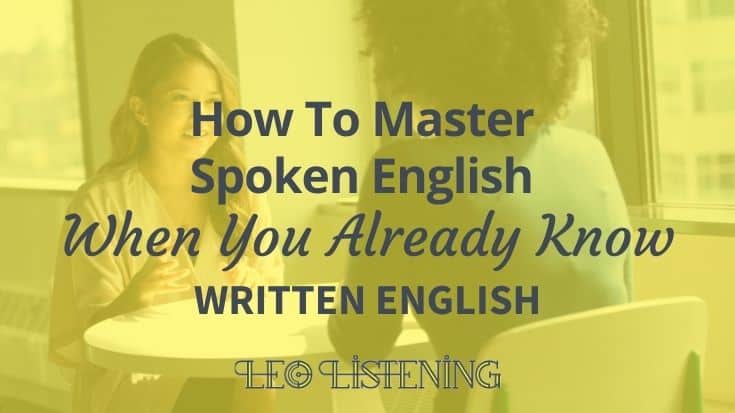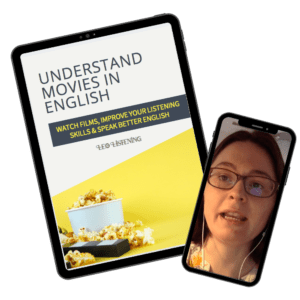How To Master Spoken English When You Already Know Written English

Do you understand written English, but you’re struggling to master spoken English?
Don’t worry. This is a common problem, and I’m here to help you so that you can understand spoken English, too.
First, this post will give you some reasons why you understand written English but not spoken English. And second, this post will show you what you can do about it.
Part 1: Why It’s Hard To Master Spoken English
Written And Spoken English Are Different
The styles of written English and spoken English are different. Here are 4 reasons why and how they are different.
1. Written English is formal, while spoken English generally is more informal
Most English teachers teach grammar and vocabulary in class, but do not really focus on speaking and pronunciation.
You’re not usually exposed to real world idioms and slang phrases in a standard English class.
But these are some of the most important things for English speech, as spoken English contains lots of idioms, phrasal verbs, and slang phrases. Plus, native speakers don’t always speak in full sentences.
2. We use lots of connected speech
As I talk about frequently, connected speech is just the natural way we talk – words in conversation flow together and sound different than when we say them in isolation (by themselves).
For example, in written English, we have the phrase “Let’s get a cup of tea.” In spoken English, the “p” in “cup” blends into the “of” and becomes “cuppa.”
“Let’s get a cuppa tea.”
Going along with this, we drop consonants a lot and reduce forms in speech.
“Going to” often becomes “gonna” or “gunna”, depending on the accent.
- Are you going to do your homework? (written)
- Are you gonna do your homework? (spoken)
- Are you gunna do your homework? (spoken, depending on the accent)
3. We use a lot of fillers
Fillers are small words and sounds that help us think, or extra words that we just say naturally in speech.
We use fillers when we are thinking or don’t know what to say. Sometimes we also repeat ourselves, and sometimes we don’t even realize we are using them!
Here are some examples of fillers:
- uh
- um
- you know / ya know
- see
- say
- mmm
Here are some examples of how fillers are used:
“What time are you, um, coming over tonight?” “Did you, ya know, ask that boy out on a date?” “Uh, that’s a good question. I liked Titanic better than Jurassic Park.”
Don’t let these fillers confuse you and trip you up when trying to listen to a conversation.
4. Maybe most importantly, speech is fast
As you know, the speed of English conversations moves fast. It’s intimidating and hard to follow along and understand.
In a conversation, we don’t have time to translate the words back to our native language, find the meaning, translate back to English, and give a response.

Part 2: How Can You Master Spoken English?
Okay, so you learned to read and understand formal English in your classroom.
It’s not a bad way to learn, especially if your goal is to do well on tests or become an author or a teacher.
But what if your goal is just to understand real English?
Essentially, you have to retrain your brain to go from “academic mode” to “real English mode.”
We have a famous saying in English “What got you here won’t get you there” which essentially means, top performers do things differently at the highest levels, such as correcting minor flaws or behaviors.
These habit changes/corrections take them from “good” to “great” in their respective fields.
The phrase “what got you here won’t get you there” is actually the title of a famous book (which unfortunately I have not read.) 🙁
But you can apply the main idea of the book to learning English — most people who are expert listeners do things differently than just learning and memorizing words from a textbook.
Master Spoken English By Just Focusing On Listening
I know it seems like common sense — the best way to master spoken English is to focus on listening.
Academic studies show that listening is the best way to improve all of your English skills.
This makes sense. In language learning, listening without speaking is called the “silent period.”
This is how babies learn a language. At first they don’t speak, because, well, they can’t.
But they absorb the language through listening and understand more than we think, until one day they finally talk.
This also explains why some students can understand a question in English and give an answer in their native language. Speaking comes after listening.
Now you are asking: Okay, great. But how do I Improve my listening?
Good question. There are countless ways. Here are three:
1. Listen to Leo-Listening Materials
Since you are reading this on leo-listening.com, you already know this site offers countless blog posts, blogcasts, YouTube videos and methods to improve your listening, so you are already in the right place!
Here’s an example to get you started.
2. Watch TV shows and Movies
Watching TV shows or movies is a great way to improve your English by having fun, and also learning about English and Western Culture.
There are all kinds of shows. What are you interested in?
You can find comedies like Modern Family or dramas like House of Cards.
Just do an internet search to find interesting and famous shows that are popular in England, Australia, the United States, etc.
Same thing with movies. You get the idea.
3. Go to YouTube
YouTube has an infinite amount of material. About 300 hours of video is uploaded every minute, around the world!
Find a subject you are interested in, then watch and listen to real authentic English.
Like cooking? Find a cooking channel.
Like sports? Watch sports videos.
Quick tip: If you are studying English and see a word you don’t know how to pronounce, you can even just type into the youTube search box “How to pronounce [word]” and this can lead you to even more English exposure.
Master Spoken English And Reduce Stress, Increase Your Energy And Speak Better
When practicing listening, the English you’re listening to must be easy and familiar to you already.
This may sound strange to you. But, if it’s too difficult, you will not learn or grow, you will feel overwhelmed, and you will give up.
It takes lots of mental (and physical!) energy to listen, especially if you don’t understand the words well.
In conversation, you need to not only listen, but respond.
If you’re using your energy to listen, then you don’t have enough energy to respond.
This is why you know vocabulary words, but when you’re ready to speak to someone, you forget them suddenly. It’s frustrating!
So the number one strategy in my opinion for improving listening is repetition.
That is, listen to the same words and materials over and over again.
These materials should be easy to intermediate in difficulty and most of the words should already be familiar to you.
Only after constant repetition will you develop a deep understanding of these words and phrases.
And you know what? Eventually you won’t have to use any energy when listening in conversations. Listening will become easy and not stressful.
This extra energy can be applied to speaking, and then your conversations will improve also. So it’s a win-win situation. Improve your listening to improve your speaking.
In fact, this is what you do in your native language. You know the words so deeply, when someone talks, you don’t even think about what the words mean. You just respond.
And you can also do this in English if you follow my above listening advice. It won’t be easy, but it’s effective.
Master Spoken English: A Few Notes
You can watch movies with subtitles, or videos with scripts, especially if it is too hard at first, but repetition is key, so you can go over the same audio dozens of times until you don’t need the subtitles or scripts anymore.
That is, until you understand the dialogue completely.
I’m not talking about going over the dialogue once or twice like you do in an English class. I’m talking about listening to the same dialogue several times a day, for a week.
Remember, repetition is key. This process is simple, not easy, but it works.
Note: Don’t forget, if you want to get rid of scripts and subtitles, check out my course, Movies on the Run.
Master Spoken English: Share Your Thoughts
Have you tried this “silent period? “Have you ever focused on listening and not speaking? Let me know in the comments.
Try it for a month: just focus on listening and not speaking. Let me know how you do in the comments. You have nothing to lose, and listening skills to gain!
Subscribe To My Newsletter To Get Your Free Guide
Want to use your favourite movie or TV show to understand native English speakers when they talk fast? Download your free guide, Understand Movies in English.


